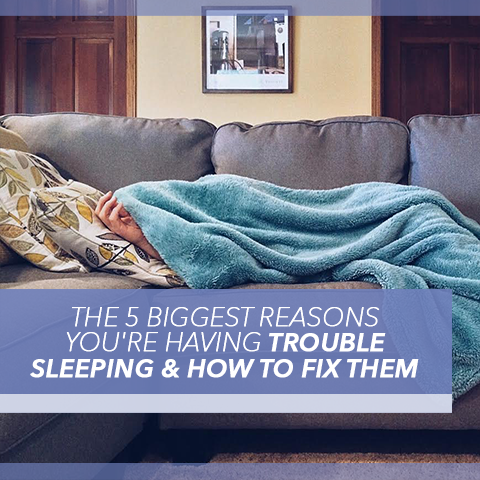
The 5 Biggest Reasons You’re Having Trouble Sleeping & How to Fix Them
It is a frustrating and annoying situation when you lay in bed each night and toss and turn. However, you aren’t alone. Americans are finding it more difficult than ever to receive the recommended seven to eight hours of sleep each night. According to a study from Iowa State University, more than five million Americans are regularly experiencing some type of sleep difficulty.
Unfortunately, there are many reasons why you may have trouble sleeping. Here are five common sleep disruptions Americans face and what you can do to fix them.
1. Sleep Apnea
Sleep apnea is a sleeping condition that affects millions of individuals around the globe. Sleep apnea occurs when you stop breathing throughout the night. While there are many causes for this condition, it is often caused because the muscles in the back of your throat relax, closing your airway. Some individuals also experience sleep apnea because their brain does not send the proper signals to their breathing muscles while asleep.
There are many signs of sleep apnea that individuals of all ages should be aware of and take seriously. The most common symptoms include:
- Waking up tired even after a full night’s sleep
- Excessive snoring
- Choking or gasping for air in the middle of the night
- Frequent headaches when you wake up
- Trouble falling asleep and staying asleep
- Waking up frequently throughout the night
What you can do: If you experience any of the above symptoms, tell your doctor. He or she may recommend you take a sleep test and work with a sleep specialist. You may begin by using a pulse oximeter as your sleep or you may be monitored overnight in the hospital or a sleep lab.
2. The Foods You Consume

The foods you consume before you crawl into bed can correlate directly to your sleep and sleep quality. Some food items, such as pizza, contain large portions of grease and salt, resulting in heartburn and acid reflux. Similar food items can also increase your thirst, causing you to drink more water. This increased water intake can result in frequent bathroom breaks throughout the night.
Alcohol is another culprit that will reduce your quality of sleep. While for some individuals it can help you fall asleep quickly, once your body metabolizes the alcohol, you will have a difficult time staying asleep.
What you can do: Avoid eating or drinking at least three hours before you crawl into bed. If you are hungry and need to eat something before you close your eyes, grab a banana or a handful of unsalted almonds.
3. Overheating
If your body becomes too warm at night, it will disrupt your sleep cycles. As you fall asleep, your body temperature naturally decreases. However, if you are sleeping in a warm room or your body temperature is high, this process is slowed down, making it difficult to fall asleep.
Many individuals do not take the time to create the ideal sleeping environment to prevent overheating. They may have their room temperature too high, wear the wrong type of clothing to bed, use a mattress that absorbs heat, or even use too many blankets.
What you can do: Create the ultimate sleeping environment that is cool and comfortable. You will want to set the temperature in your bedroom to a cool 63 or 65 degrees Fahrenheit. Also, purchase cool bedding such as cool pillows and mattress pads.
Cool-Jams moisture-wicking pajamas are designed to dissipate the heat and keep you cool all night long. With advanced technology, these pajamas will absorb moisture so you don’t wake up covered in sweat. Plus, a variety of designs, colors, and styles will help you find the perfect pair for lounging around the house, traveling, and more.
4. Screen Time

Are you guilty of spending time in front of a screen before you close your eyes? If so, you may be hurting your chance of a good night’s sleep. Smartphones, tablets, and other technological devices emit blue light. This type of light boasts a short wavelength and releases more energy than other types of visible light. This will increase your attention and reaction times. It will also affect your melatonin production levels, making it harder for you to fall asleep each night.
What you can do: To help you fall asleep quickly, give yourself a technology curfew. Put away all tech devices at least one hour before bed. Rather than watch a TV show or scroll through your social media feed, spend time reading a book, writing in your journal, or completing relaxation exercises and bedtime yoga.
5. Doing Too Much
The end of the day is not a race to see how many extra items you can cross off your to-do list. Unfortunately, many individuals try to cram in as much activity as they can before they crawl into bed such as completing household chores, finishing work-related tasks, working on a hobby, exercising, etc. These types of activities are waking up your body and mind, rather than letting them calm down and fall asleep.
What you can do: At least one hour before bed, slow down. Do not pull out your tech devices but grab a book or write in a journal. You may consider activities such as meditation or yoga to clear your mind and focus on your breathing. Consider activities that will help you to relax and reduce your stress levels.
You deserve quality sleep each time you lay down. By focusing on your behaviors and patterns before you head to bed, you can more easily experience a good night’s sleep — every night. If you still have difficulties, consult with your doctor.




